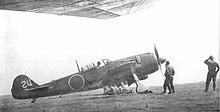Nakajima Ki-116
| Ki-116 | |
|---|---|
| Role | Single seat fighter |
| Manufacturer | Manshūkoku Hikōki Seizo KK |
| First flight | 1945 |
| Primary user | Imperial Japanese Army Air Force |
| Number built | 1 |
| Variants | Nakajima Ki-84 |
The Nakajima Ki-116 was a late-World War II aircraft developed for the Imperial Japanese Army Air Force. It was essentially a Ki-84 Hayate with the Nakajima Ha-45 engine replaced with a Mitsubishi Ha-112. The design was handled by Mansyū Aircraft in Manchukuo, and thus it is often designated Mansyū Ki-116.
Design and development

The Ki-116 was the last variant of the Nakajima Ki-84 Hayate to enter flight trials. It was originally the fourth Mansyu-built Ki-84-I, adapted to take a 1,100 kW (1,500 hp) Mitsubishi Ha-112-II (aka Kinsei 62) engine, the same engine used in the Kawasaki Ki-100, driving a three-blade propeller borrowed from a Mitsubishi Ki-46-III Dinah. This conversion proved to be very successful, a reduction of 450 kg (1,000 lb) in empty weight being registered. The aircraft was still undergoing tests at the time of Japan's defeat.[1][2][3] It appeared somewhat longer and had an increased tail surface area compared to the original Ki-84.[3][4][5]
This aircraft was created as a fighter-interceptor. There is no indication that it was intended for the Special Attack suicide role (shimbu-tai).
One aircraft was built at Manshūkoku Hikōki Seizo KK at their plant in Harbin in 1945.
Specifications
General Characteristics
- Crew: one
- Length: 9.93 m (32 ft 7 in)
- Wingspan: 11.23 m (36 ft 11 in)
- Height: 3.38 m (11 ft 1 in)
- Wing Area: 21 m2 (226 ft²)
- Empty Weight: 2,240 kg (4,938lb)
- Loaded Weight: 3,192 kg (7,039lb)
- Powerplant: Mitsubishi Ha-112-11
- Armament: 2x 20mm Ho-5 cannons in wings and 2x 12.7mm Ho-103 machine guns in upper fuselage
See also
Related development
Aircraft of comparable role, configuration, and era
Related lists
References
- Notes
- ^ Francillon 1966, p. 10.
- ^ Francillon 1979, p. 235.
- ^ a b Bueschel 1971, p. 16.
- ^ Taylor 1977, p. 267
- ^ Green & Swanborough 1977, p. 56.
- Bibliography
- Aeronautical Staff of Aero Publishers Inc. Nakajima KI-84 (Aero Series 2). Fallbrook, CA: Aero Publishers, Inc., 1965. ISBN 0-8168-0504-0.
- Bueschel, Richard M. (1971). Nakajima Ki. 84a/b Hayate : in Japanese Army Air Force service. Richard Ward. [Reading, England]: Osprey. ISBN 0-85045-044-6. OCLC 7134997.
- Caruana, Richard J. "The Nakajima Ki-84 Hayate" Article and scale drawings. Scale Aviation Modeller International. Volume 10 Issue 10 October 2004. Bedford, UK.
- Francillon, René J. (1966). The Nakajima Hayate (Aircraft in Profile number 70). Leatherhead, Surrey, UK: Profile Publications Ltd..
- Francillon, René J. (1979). Japanese aircraft of the Pacific War. London: Putnam. ISBN 0-370-30251-6. OCLC 6124909. (new edition 1987 by Putnam Aeronautical Books, ISBN 0-85177-801-1.)
- Fearis, P. "The Emperor's Wings; The Nakajima Ki-84 Hayate." Article and scale drawings. Scale Aviation Modeller. Volume 2 Issue 1 January 1996. Bedford, UK.
- Green, William. War Planes of the Second World War, Volume Three: Fighters. London: Macdonald & Co. (Publishers) Ltd., 1961 (seventh impression 1973). ISBN 0-356-01447-9.
- Green, William; Swanborough, Gordon (1977). WW2 Aircraft Fact Files: Japanese Army Fighters, Part 2. London: Macdonald and Jane's. ISBN 0-354-01068-9.
- Taylor, John W. R. (1977). Combat aircraft of the world : from 1909 to the present (Berkley Windhover ed.). New York: Putnam. ISBN 0-425-03633-2. OCLC 911790791.</ref>
- Wieliczko, Leszek A. Nakajima Ki-84 Hayate. Lublin, Poland: Kagero, 2005. ISBN 83-89088-76-2. (Bilingual Polish/English)
